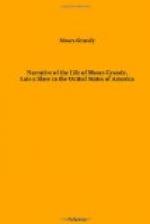During the struggles which have procured for us this justice from our fellow-citizens, we have been in the habit of looking in public places for some well-known abolitionists, and, if none that we knew were there, we addressed any person dressed as a Quaker; these classes always took our part against ill usage, and we have to thank them for many a contest in our behalf.
We were greatly delighted by the zealous efforts and powerful eloquence in our cause of Mr. George Thompson, who came from our English friends to aid our suffering brethren. He was hated and mobbed by bad men amongst the whites; they put his life in great danger, and threatened destruction to all who sheltered him. We prayed for him, and did all we could to defend him. The Lord preserved him, and thankful were we when he escaped from our country with his life. At that time, and ever since, we have had a host of American friends, who have labored for the cause night and day; they have nobly stood up for the rights and honor of the colored man; but they did so at first in the midst of scorn and danger. Now, thank God, the case is very different. William Lloyd Garrison, who was hunted for his life by a mob in the streets of New York, has lately been chairman of a large meeting in favor of abolition, held in Faneuil Hall, the celebrated public hall of Boston, called the ‘Cradle of Liberty.’
I am glad to say also that numbers of my colored brethren now escape from slavery; some by purchasing their freedom, others by quitting, through many dangers and hardships, the land of bondage. The latter suffer many privations in their attempts to reach the free states. They hide themselves, during the day, in the woods and swamps; at night, they travel, crossing rivers by swimming or by boats they may chance to meet with, and passing over hills and meadows which they do not know: in these dangerous journeys they are guided by the north-star, for they only know that the land of freedom is in the north. They subsist only on such wild fruit as they can gather, and as they are often very long on their way, they reach the free states almost like skeletons. On their arrival they have no friends but such as pity those who have been in bondage, the number of whom, I am happy to say, is increasing; but if they can meet with a man in a broad-brimmed hat and Quaker coat, they speak to him without fear—relying on him as a friend. At each place the escaped slave inquires for an abolitionist or a Quaker, and these friends of the colored man help them on their journey northwards, until they are out of the reach of danger.




